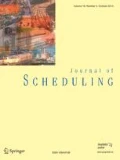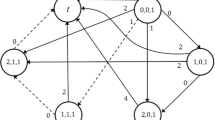Abstract
This study proposes an exact algorithm for the general single-machine scheduling problem without machine idle time to minimize the total job completion cost. Our algorithm is based on the Successive Sublimation Dynamic Programming (SSDP) method. Its major drawback is heavy memory usage to store dynamic programming states, although unnecessary states are eliminated in the course of the algorithm. To reduce both memory usage and computational efforts, several improvements to the previous algorithm based on the SSDP method are proposed. Numerical experiments show that our algorithm can optimally solve 300 jobs instances of the total weighted tardiness problem and the total weighted earliness-tardiness problem, and that it outperforms the previous algorithms specialized for these problems.
Similar content being viewed by others
References
Abdul-Razaq, T. S., & Potts, C. N. (1988). Dynamic programming state–space relaxation for single-machine scheduling. Journal of the Operational Research Society, 39, 141–152.
Christofides, N., Mingozzi, A., & Toth, P. (1981). State–space relaxation procedures for the computation of bounds to routing problems. Networks, 11, 145–164.
Congram, R. K., Potts, C. N., & van de Velde, S. L. (2002). An iterated dynasearch algorithm for the single-machine total weighted tardiness scheduling problem. INFORMS Journal on Computing, 14, 52–67.
Crauwels, H. A. J., Potts, C. N., & Van Wassenhove, L. N. (1998). Local search heuristics for the single machine total weighted tardiness scheduling problem. INFORMS Journal on Computing, 10, 341–350.
Dyer, M. E., & Wolsey, L. A. (1990). Formulating the single-machine sequencing problem with release dates as a mixed integer problem. Discrete Applied Mathematics, 26, 255–270.
Fisher, M. L. (1973). Optimal solution of scheduling problems using Lagrange multipliers: part I. Operations Research, 21, 1114–1127.
Fisher, M. L. (1985). An applications oriented guide to Lagrangian relaxation. Interfaces, 15, 10–21.
Grosso, A., Della Croce, F., & Tadei, R. (2004). An enhanced dynasearch neighborhood for the single-machine total weighted tardiness scheduling problem. Operations Research Letters, 32, 68–72.
Ibaraki, T. (1987). Enumerative approaches to combinatorial optimization. Annals of Operations Research, 10–11.
Ibaraki, T., & Nakamura, Y. (1994). A dynamic programming method for single machine scheduling. European Journal of Operational Research, 76, 72–82.
Liaw, C.-F. (1999). A branch-and-bound algorithm for the single machine earliness and tardiness scheduling problem. Computers & Operations Research, 26, 679–693.
Pan, Y., & Shi, L. (2007). On the equivalence of the max-min transportation lower bound and the time-indexed lower bound for single-machine scheduling problems. Mathematical Programming, Series A, 110, 543–559.
Péridy, L., Pinson, É., & Rivreau, D. (2003). Using short-term memory to minimize the weighted number of late jobs on a single machine. European Journal of Operational Research, 148, 591–603.
Potts, C. N., & Van Wassenhove, L. N. (1985). A branch and bound algorithm for the total weighted tardiness problem. Operations Research, 33, 363–377.
Pritsker, A. A. B., Watters, L. J., & Wolfe, P. M. (1969). Multiproject scheduling with limited resources: a zero-one programming approach. Management Science, 16, 93–108.
Sourd, F. (2006). A reinforced Lagrangean relaxation for non-preemptive single machine problem. In Proceedings of tenth international workshop on project management and scheduling, Poznań, Poland, 26–28 April 2006.
Sourd, F. (2008). New exact algorithms for one-machine earliness-tardiness scheduling. INFORMS Journal on Computing. doi: 10.1287/ijoc.1080.0287
Sousa, J. P., & Wolsey, L. A. (1992). A time indexed formulation of non-preemptive single machine scheduling problems. Mathematical Programming, 54, 353–367.
Tanaka, S., Fujikuma, S., & Araki, M. (2006). A branch-and-bound algorithm based on Lagrangian relaxation for single-machine scheduling. In Proceedings of international symposium on scheduling 2006 (pp. 148–153), Tokyo, Japan, 18–20 July 2006.
van den Akker, J. M., van Hoesel, C. P. M., & Savelsbergh, M. W. P. (1999). A polyhedral approach to single-machine scheduling problems. Mathematical Programming, 85, 541–572.
van den Akker, J. M., Hurkens, C. A. J., & Savelsbergh, M. W. P. (2000). Time-indexed formulations for machine scheduling problems: Column generation. INFORMS Journal on Computing, 12, 111–124.
Author information
Authors and Affiliations
Corresponding author
Rights and permissions
About this article
Cite this article
Tanaka, S., Fujikuma, S. & Araki, M. An exact algorithm for single-machine scheduling without machine idle time. J Sched 12, 575–593 (2009). https://doi.org/10.1007/s10951-008-0093-5
Received:
Accepted:
Published:
Issue Date:
DOI: https://doi.org/10.1007/s10951-008-0093-5




